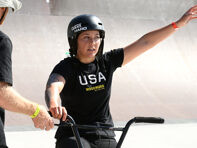Emily Bridges set national records to begin her competitive cycling career. But now, she’s gearing up for her greatest triumph: competing as her true self.
The Commonwealth Games announced this week it will allow a transgender female cyclist to race against women. While Bridges isn’t named in the news release, it’s safe to say she’s the cyclist to whom the article is referring. After a year of hormone therapy, the British native is set to compete in the female category.
Bridges spoke about her transition earlier this month to Cycling Weekly. The story traces her three-year journey, in which her love for cycling evaporated as she sorted out her gender identity.
“By the summer of 2020, I’d fallen out of love with the sport,” she said. “I couldn’t live like that anymore – I couldn’t be my true self.”
Bridges’ anguish prompted her to go public and begin living openly as a woman. But since British Cycling’s transgender policy mandates that a rider’s testosterone level stays below 5 nmol/L (nanomoles per liter) for at least 12 months before their first race, Bridges competed against men last season.
She didn’t perform well. In the elite men’s crit at the Loughborough Cycling Festival last May, she finished 43rd out of 45. Her final men’s race was the Welsh National Championship in September. Bridges finished second to last.
Previously, she set national records in the junior male category. Bridges won her first silver medal at junior nationals when she was 16, and took home two silvers at the national track championships that August.
Used to winning, Bridges found her lackluster performances upsetting. But she never regretted her decision to go on hormone therapy.
Mental wellness is more important than winning medals.
“Immediately the positives [from hormone therapy] were — I felt so much better mentally, like I could actually feel my emotions – a lot of pressure lifted,” she said.
The success of swimmer Lia Thomas — she became last week the first trans athlete to win an NCAA Division 1 national title — has supercharged an already polarizing debate about trans inclusion in female athletics. Bridges has also faced vitriol herself.
Last April, Bridges’ mom shot down unsubstantiated rumors about her daughter, including speculation that she has been selected to represent Great Britain in the Tokyo Olympics.
“What sticks with me is how polarised the reactions were. There was a lot of positivity: lots of really nice messages from friends and people I’d never met, mostly female cyclists, offering their support,” Bridges told CW. “That support was important because there was also a lot of backlash.”
After some uncertainty, medical chiefs from the Commonwealth Games agreed on a blanket transgender policy that effectively honors international federation rules for each sport.
Bridges meets the standards in cycling. Her inclusion in the female category is allowing her to fall in love with the sport again.
“I just want to have a good time, to have fun,” she said. “I just want to race and race competitively again.”
The Commonwealth Games will take place in Birmingham, U.K. from July 28 — Aug. 8.





































